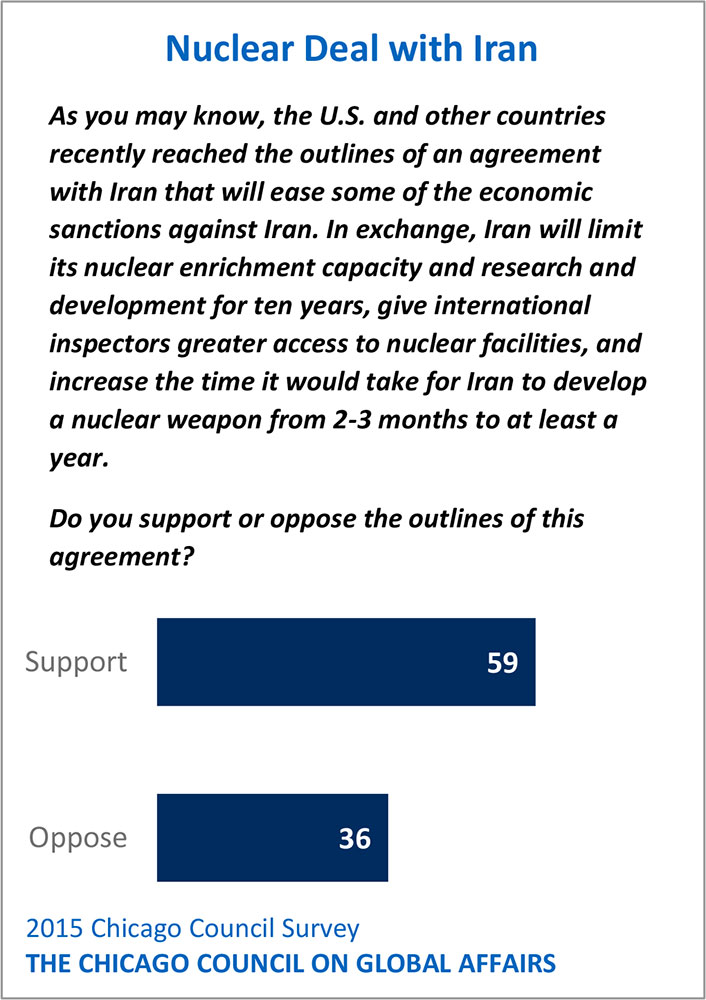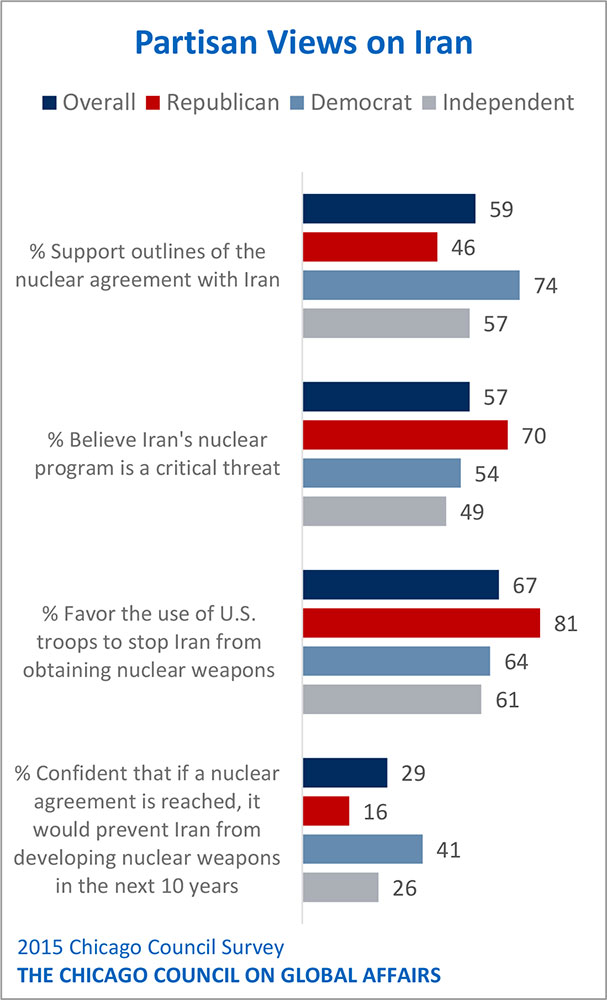According to the 2015 Chicago Council Survey, most Americans support the general idea of an agreement with Iran to limit its nuclear program to civilian uses.
Introduction
A majority of Americans support the broad outlines of an agreement with Iran to limit its nuclear program to civilian uses, according to results from the May 25-June 17, 2015 Chicago Council Survey. While the public prefers a diplomatic solution, majorities also appear willing to use force to prevent Iran from becoming a nuclear state.
Key Findings
- Six in ten Americans favor the framework of an agreement with Iran.
- Two thirds support using US troops to stop Iran from obtaining nuclear weapons.
- Nearly six in ten support US airstrikes against Iranian nuclear facilities if Iran violates the deal.

At the same time, in principle, Americans seem willing to use force to prevent Iran from obtaining a nuclear weapon. Before any mention of the current negotiations with Iran in the survey, two in three Americans said they would support "the use of US troops to stop Iran from obtaining nuclear weapons" (67%), on par with opinion in 2014. If Iran violates the agreement, majorities would support the United States conducting cyber-attacks against Iran's computer systems (60%) and airstrikes against Iran's nuclear facilities (56%). Fewer support sending US troops to destroy Iran’s nuclear facilities (44% support, 51% oppose).
Majority of Americans Label Iran's Nuclear Program a Critical Threat
Americans' willingness to use force against Iran rests upon the perception that a nuclear Iran is a critical threat to the United States and a negative force in its region. The public rates the possibility of unfriendly countries becoming nuclear powers (59%) and specifically Iran’s nuclear program (57%) among the seven most critical threats facing the United States. In addition, nearly eight in ten Americans say that Iran plays a somewhat negative (44%) or very negative (33%) role in the Middle East today.
Questions about Lasting Impact
If a deal is reached, Americans are unsure about its lasting effects. Only three in ten are confident that the agreement will prevent Iran from developing nuclear weapons in the next ten years (29%; 69% are not), a finding consistent with other surveys on this issue. Even those who support the agreement tend to doubt its ability to prevent Iran from developing a nuclear weapon in ten years (42% of deal supporters versus 9% of those who oppose the deal). While a slim majority of those who support the deal tend to think it will help Iran’s economy (54%) and improve the United States’ image (52%), fewer are confident that an agreement will improve Israel’s security (34%); improve political freedoms in Iran (28%); reduce Iranian support for terrorist groups (25%); and weaken Iran’s government (23%).
Partisan Differences on Deal, but Shared Support for Action if Iran Violates
There are some clear partisan differences among the public on attitudes toward a deal with Iran. A solid majority of self-described Democrats (74%) and a smaller majority of Independents (57%) favor the nuclear deal, while Republicans tend to oppose it (51%, 46% support). Likewise, Democrats (41%) are more confident than Republicans (16%) or Independents (26%) that the deal will prevent Iran from acquiring nuclear weapons in the next decade. Democrats are also more confident than others in the deal’s ability to improve the image of the US in the world (53%), help the Iranian economy (52%), improve Israel’s security (47%) and improve political freedoms in Iran (38%).

While majorities across political parties support using US troops to stop Iran from obtaining nuclear weapons, only among Republicans do a majority (53%) favor sending US troops to destroy Iran’s nuclear facilities if Iran commits a violation of the accord (53% versus 44% of Democrats and 37% of Independents).
Methodology
The analysis in this report is based on data from the 2015 Chicago Council Survey of the American public on foreign policy. The 2015 Chicago Council Survey was conducted by GfK Custom Research between May 25 and June 17, 2015 among a national sample of 2,034 adults, 18 years of age or older, living in all 50 US states and the District of Columbia using the KnowledgePanel, GfK’s large-scale, nationwide online research panel. The margin of error ranges from ± 2.2 to ± 3.1.








